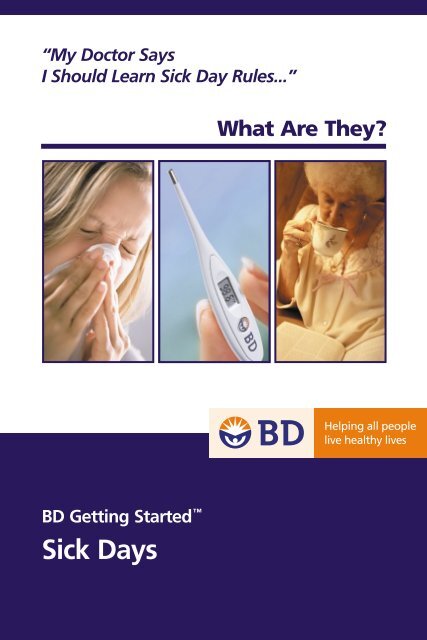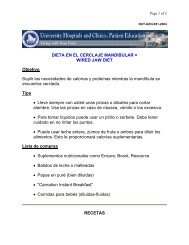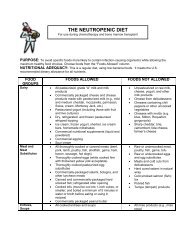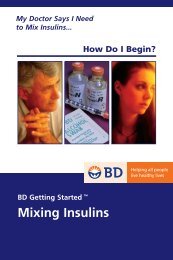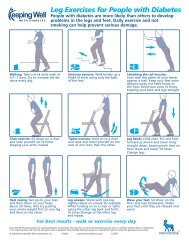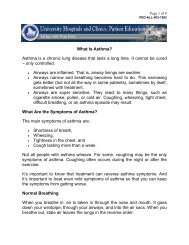3253-Sick Days English - Rowland Medical Library
3253-Sick Days English - Rowland Medical Library
3253-Sick Days English - Rowland Medical Library
Create successful ePaper yourself
Turn your PDF publications into a flip-book with our unique Google optimized e-Paper software.
“My Doctor Says<br />
I Should Learn <strong>Sick</strong> Day Rules...”<br />
BD Getting Started <br />
<strong>Sick</strong> <strong>Days</strong><br />
What Are They?
1<br />
What’s different<br />
about being sick<br />
because I have<br />
diabetes?<br />
When most people are sick with a cold<br />
or the flu, they usually rest, drink tea<br />
or chicken soup. If they do not start to<br />
feel better in a couple of days, they will<br />
usually call their doctor. When you have<br />
diabetes, not feeling well affects your<br />
eating patterns and how your blood<br />
sugar reacts to your usual dose of<br />
insulin or diabetes pills. When you are<br />
sick, your body will release hormones<br />
that work to help your body fight against your illness,<br />
but they will also make your blood sugar levels rise.<br />
This means that your diabetes will be more difficult<br />
to control when you are sick. That is why it is so<br />
important to plan ahead and be prepared in case<br />
of illness.<br />
<strong>Sick</strong>ness can include: a cold, flu-like symptoms such<br />
as vomiting, diarrhea, sore throat, and infections such<br />
as ear, teeth or bladder, or more serious illnesses like<br />
pneumonia or a foot infection.
What happens when I am sick?<br />
Illness puts your body in a state of stress. When you<br />
don’t feel well, your body produces stress hormones.<br />
These hormones work to help your body fight the<br />
infection or injury that is making you sick. They send<br />
a signal to your liver to release sugar to help in the<br />
fight. This makes your blood sugar rise.<br />
In people without diabetes, when the liver releases<br />
sugar to help the body fight against the illness, the<br />
pancreas also makes extra insulin. This allows the body<br />
to use the sugar for energy and the blood sugar remains<br />
within a normal range. However, if you have diabetes,<br />
your body cannot make the extra insulin needed and<br />
your blood sugar will go up. The stress hormones also<br />
work against insulin. Together, the sugar produced<br />
from your liver and the stress hormones act to make<br />
your blood sugar rise 1 . You can see how illness can<br />
cause blood sugar levels to go out of control. If not<br />
treated quickly, high blood sugar levels caused by<br />
illness can lead to more serious problems<br />
like Diabetes Ketoacidois (DKA) or<br />
Hyperosmolar Hyperglycemic<br />
Non-ketotic Syndrome (HHNK).<br />
1 Franz, Marion J. Editor,<br />
Diabetes Management<br />
Therapies, A Core Curriculum<br />
for Diabetes Education,<br />
Fourth Edition, 2001. p.264<br />
2
3<br />
SICK DAY RULES<br />
Special rules have been developed to help you manage<br />
your diabetes when you are sick. Following these<br />
guidelines will help you manage your diabetes and<br />
recover from your illness without complications.<br />
1. Drink Fluids — even if you are able to eat food.<br />
You need to replace the fluids that your body loses due<br />
to high blood sugars, fever, vomiting and diarrhea.<br />
When you are sick or not feeling well you may drink less<br />
than when they are well. You need to drink fluids to<br />
prevent dehydration (loss of water). It is recommended<br />
that you must drink fluids every hour that you are<br />
awake. All fluids should be caffeine free because<br />
caffeine acts like a water pill or diuretic. Drinks that<br />
contain caffeine will make the dehydration worse.<br />
Here is what to do:<br />
• Place an 8-oz. glass next to your bed or chair.<br />
• Every hour — sip 8 oz. of sugar-free,<br />
caffeine-free drinks. The best fluids<br />
to drink when you are sick are:<br />
— Water<br />
— Sugar-free soft drinks<br />
— Green tea or black tea<br />
without milk<br />
• Every third hour — sip 8 oz. of one<br />
of the following types of soup<br />
(to provide sodium and other<br />
minerals that your body needs):<br />
— Broth<br />
— Bouillon (clear, thin soup)<br />
— Canned clear soup
• If your blood sugar is running low, you<br />
may need to drink some fluids that have<br />
carbohydrates or sugar in them. See<br />
“Foods for <strong>Sick</strong> Day Use” on page 7.<br />
Note: When you are sick, you may<br />
sometimes find if you eat less and take<br />
your medication, your blood sugar is only<br />
a little higher than usual. This is because<br />
your body is turning to fat to meet its<br />
needs for energy. This can put you at risk for developing<br />
DKA. Therefore it is important to take your medication<br />
and drink fluids that contain carbohydrates to replace<br />
the amount of carbohydrate in the food that you would<br />
normally be eating.<br />
2. Check your blood sugar.<br />
Your blood sugar level can rise before you even know<br />
you are sick. If you should have a few high blood sugar<br />
readings you cannot explain, it could be that you<br />
are coming down with a cold or other illness.<br />
• Check your blood sugar every 2 to 4<br />
hours when you are sick — especially<br />
if you are throwing up.<br />
• Write the results in your logbook or<br />
the <strong>Sick</strong> Day Record on page 12.<br />
• Report any high blood sugar results by<br />
telephone to your doctor or diabetes<br />
educator as soon as possible.<br />
• If your blood sugar is high every time you check it,<br />
you may need to change your diabetes medication<br />
or insulin dose. If you are unsure if more medicine is<br />
needed, call your doctor or diabetes educator.<br />
4
5<br />
3. Never skip your insulin injection or medication<br />
when you are sick!<br />
Many people with diabetes forget that their blood sugar<br />
levels go up when they are sick. They think, since they<br />
are not eating, there is no sugar in their blood and then<br />
there is no need to take insulin or other diabetes<br />
medicine. Because they are not eating or eating less<br />
than usual, they do not take their medication or insulin.<br />
In fact, you may need more medication or insulin when<br />
you are sick because illness makes your blood sugar rise.<br />
ALWAYS TAKE YOUR DIABETES MEDICINE. If you are<br />
unsure if more medicine is needed,<br />
you should call your doctor or<br />
diabetes educator for advice.<br />
• If you are taking insulin:<br />
— The full dose of daily insulin<br />
is usually required.<br />
— Take the usual dose of intermediate<br />
or long acting insulin (NPH, Lente,<br />
Ultralente, or Lantus ® ).<br />
— You may need to take frequent doses of<br />
short-acting or rapid-acting insulin if your<br />
blood sugar is high, or ketones are present.<br />
— If you use an insulin pump, continue the usual<br />
basal dose. Contact your doctor if the basal<br />
rate does not seem to be keeping your blood<br />
sugars in range.<br />
• If you are taking diabetes pills:<br />
— You should take your pills as usual.<br />
— If you think you may have vomited your pills,<br />
do not take any more pills and report this event<br />
to your doctor or diabetes educator.
— Sometimes your doctor may want you to take<br />
insulin for a short period of time instead of pills<br />
until your blood sugar comes down and you<br />
start to feel better.<br />
4. Check your blood or urine for ketones whenever<br />
you are sick — or if your blood sugar stays higher<br />
than 240 mg/dl.<br />
The presence of ketones in<br />
the urine becomes a concern<br />
for people with diabetes if<br />
they have high blood sugar. If<br />
you have diabetes, ketones in your<br />
urine means that your body is in trouble –<br />
you are burning fat for energy instead of sugar because<br />
there is not enough insulin available. If you measure<br />
ketones in your blood above .6mmol/L or moderate to<br />
large ketones in your urine when you are sick, report<br />
this to your doctor or diabetes educator right away -<br />
especially if you have type 1 diabetes.<br />
• Blood or urine ketone levels should be tested<br />
every 4 hours until readings are negative.<br />
5. Take your temperature —<br />
fever can cause you to<br />
become dehydrated.<br />
A fever may be a sign<br />
of infection.<br />
6
7<br />
What do I do if I don't feel like eating?<br />
Sometimes, you just don’t feel like eating when you are<br />
sick. Even dry toast seems like too much. When you have<br />
no appetite or can’t face food, try drinking fluids or eating<br />
soft foods that contain carbohydrates or sugar instead of<br />
solid foods.<br />
• Try to replace the carbohydrate portion of a meal<br />
with an equal amount of carbohydrate from semisolid<br />
foods or fluids. (Drinks that contain sugar or<br />
carbohydrates rather than sugar-free foods will give<br />
you the energy you need to fight fever and infection.)<br />
If you don’t know your carbohydrate goal or can only take<br />
small amounts of food at a time, choose three or four<br />
servings from the list below every three to four hours. 2<br />
For <strong>Sick</strong> Day Use – Foods containing<br />
15 grams of carbohydrate<br />
1<br />
⁄2 cup apple juice<br />
1<br />
⁄2 cup sweetened, caffeine-free<br />
soft drink<br />
1 Popsicle ® stick<br />
1 cup sports drink<br />
1<br />
⁄2 cup sweetened ice cream<br />
1<br />
⁄4 cup sherbet<br />
1<br />
⁄4 cup sweetened pudding<br />
1<br />
⁄2 cup sweetened<br />
gelatin/Jell-O ®<br />
• 1 cup artificially sweetened or plain yogurt (not frozen)<br />
• 1 cup milk<br />
2<br />
American Diabetes Association, Clinical Practice<br />
• 1 cup soup<br />
Recommendations 2002: Evidence — Based<br />
Nutrition Principles and Recommendations for<br />
• 1 slice of toast<br />
the Treatment and Prevention of Diabetes and<br />
Related Complications Position Statement,<br />
• 5-6 crackers<br />
Diabetes Care, 25: Supplement 1: S50-S60, 2002.
What if I can only keep fluids down?<br />
If you can’t eat, you will need to alternate fluids that<br />
have calories with no-calorie/no-carbohydrate drinks all<br />
day, as follows:<br />
• First hour — drink 4-8 oz. of regular soda<br />
• Next hour or two — drink 4-8 oz. of water or seltzer<br />
This will let you gradually add the<br />
calories and fluids that your body<br />
needs through the day. As soon as<br />
your appetite returns, you can slowly<br />
introduce your usual foods. If you've<br />
been sick to your stomach, start by<br />
drinking clear liquids (drinks you can<br />
see through, such as broth, tea, Jell-O ® ,<br />
regular soft drinks and Popsicle ® sticks.<br />
When you can keep these down, move on<br />
to full liquids (orange or tomato juice, ice cream<br />
and soup) and then to soft foods (oatmeal, toast,<br />
plain cooked vegetables, applesauce, rice, noodles<br />
and crackers). Remember to eat the same amount<br />
of carbohydrate as usual.<br />
Note: It may be confusing to hear that you should eat<br />
foods that contain carbohydrates or sugar when you<br />
know that being sick raises your blood sugar. However,<br />
because you can’t always eat a typical meal when you<br />
are sick, you sometimes need to eat small amounts of<br />
foods with carbohydrates or sugar to get the food your<br />
body requires to fight off your infection.<br />
If you are not sure what foods to eat when sick,<br />
call your doctor or diabetes educator.<br />
8
9<br />
What if I’m too sick to follow all<br />
the rules?<br />
Taking care of yourself when you are sick sounds<br />
simple: drink fluids, check your blood sugar, check<br />
your blood or urine for ketones and take your<br />
medication. The problem is that when you are sick,<br />
everything is an effort and many people feel too weak<br />
to do everything they should. Try asking a neighbor or<br />
family member for help and keep these <strong>Sick</strong> Day Rules<br />
handy for their use.<br />
<strong>Sick</strong> Day Supplies – foods to keep on the shelf<br />
No one feels like running out to the store when they<br />
are sick. Be prepared for <strong>Sick</strong> <strong>Days</strong> by having a few<br />
supplies in the house including:<br />
• 1 box sugar-free gelatin or Jell-O ®<br />
• 1 box sweetened gelatin or Jell-O ®<br />
• 1 box of instant broth<br />
• 1 bottle of apple juice<br />
• 1 box sweetened pudding<br />
• 1 bottle sports drink<br />
• Urine ketone testing strips<br />
(check the expiration date)<br />
• Thermometer
Can I use over-the-counter drugs?<br />
Preparations you can buy in the drug store without a<br />
prescription such as cold and cough products may raise<br />
your blood sugar. Be sure to ask your<br />
doctor or pharmacist if a product is<br />
safe for you. Mention your diabetes,<br />
as well as any other conditions you<br />
may have (high blood pressure etc.)<br />
and any other medications<br />
(prescription and over-the-counter)<br />
that you are currently taking.<br />
Could prescription medicine raise<br />
or lower my blood sugar?<br />
Some medications are prescribed<br />
because they are the best choice to<br />
treat your illness. However, they<br />
may make your blood sugar go up<br />
or down. The best thing to do is<br />
to ask your doctor or<br />
diabetes educator.<br />
4 Kruger, D.F. The Diabetes Travel Guide. P119, American Diabetes Association, 2000.<br />
10
11<br />
Phone Alert! Call your health care provider immediately<br />
or have someone call for you, if you:<br />
• Have trouble breathing.<br />
• Vomit more than once and are unable to keep food<br />
down more than 6 hours (repeated vomiting might<br />
require a visit to the emergency room for IV fluids).<br />
• Have diarrhea more than 5 times or for longer than<br />
6 hours.<br />
• Lose 5 pounds or more during the time that you<br />
are sick.<br />
• Have temperature over 101 degrees F.<br />
• Have 2 or more blood glucose readings in a<br />
row that are greater than 240 mg/dl or lower<br />
than 60 mg/dl.<br />
• Have moderate or large ketones in your<br />
urine or blood ketones above 0.6 mmol/L.<br />
• Have a “fruity” odor to your breath.<br />
• Have any questions about what you should do.<br />
If you feel sleepy or can’t think clearly — have someone<br />
call your doctor or diabetes educator or take you to an<br />
emergency room.
SICK DAY RECORD<br />
Fill in when sick and report results when you call your health care provider.<br />
Check List to Use<br />
While You are <strong>Sick</strong><br />
How much do you<br />
weigh today?<br />
How much liquid<br />
did you drink today?<br />
What is your<br />
temperature?<br />
What diabetes medicine or<br />
insulin did you take?<br />
How much?<br />
What other medicine<br />
did you take?<br />
How much?<br />
What is your blood<br />
sugar level?<br />
What are your urine<br />
ketones?<br />
How are you breathing?<br />
Any Stomach pain, fast<br />
breathing, diarrhea,<br />
vomiting, fruity odor<br />
to breath, temperature<br />
over 101 o F?<br />
When to<br />
Check<br />
Every day<br />
Every evening<br />
Every morning<br />
and evening<br />
Every 4 hours<br />
or before<br />
every meal<br />
Every 2 to 4<br />
hours<br />
Every 4 hours<br />
or each time<br />
you pass urine<br />
Every 4 to 6<br />
hours<br />
Every day or<br />
evening<br />
Results<br />
_______ pounds<br />
_______ 8 oz. glasses<br />
_______ am<br />
_______ pm<br />
Medicine/Time/Dose<br />
__________________________________<br />
__________________________________<br />
__________________________________<br />
Medicine/Time/Dose<br />
__________________________________<br />
__________________________________<br />
__________________________________<br />
Time/Blood Sugar<br />
__________________________________<br />
__________________________________<br />
__________________________________<br />
Time/Ketones<br />
__________________________________<br />
__________________________________<br />
__________________________________<br />
Time/Condition<br />
__________________________________<br />
__________________________________<br />
__________________________________<br />
Time/Symptom<br />
__________________________________<br />
__________________________________<br />
__________________________________<br />
Adapted from: Department of Health and Human Services, Centers for Disease Control and<br />
Prevention, National Center for Chronic Disease Prevention and Health Promotion, Division of<br />
Diabetes Translation, Take Charge of Your Diabetes, Third Edition, 2002.<br />
12
Written by:<br />
Virginia Peragallo-Dittko, RN, BC-ADM, MA, CDE<br />
Mineloa, NY<br />
We wish to acknowledge the following health professionals for<br />
reviewing this publication and providing their valuable insights:<br />
Ann Fittante,RD, MS, CDE<br />
Seattle, WA<br />
Marjorie Cypress, RN, MSN, NP, CDE<br />
Albuquerque, NM<br />
Andrea Zaldivar, RN, MSN, NP, CDE<br />
New York, NY<br />
BD provides this brochure for informational purposes only. It is not intended to be a<br />
substitute for professional medical advice, diagnosis or treatment. Always seek the<br />
advice of your physician or other qualified healthcare provider with any questions<br />
you may have regarding a medical condition. Never disregard professional medical<br />
advice or delay in seeking it because of something you have read in this brochure.<br />
Educational Information from BD Consumer Healthcare.<br />
BD, BD Logo and all other trademarks are the property of Becton, Dickinson<br />
and Company. ©2002 BD.<br />
Lantus is a trademark of Aventis Pharma Deutschland GmBH<br />
Jello is a trademark of Kraft Food Holdings, Inc.<br />
Popsicle is a trademark of Lipton Investments, Inc.<br />
All other brands are trademarks of their respective holders.<br />
BD Consumer Healthcare<br />
1 Becton Drive<br />
Franklin Lakes, NJ 07417-1883<br />
1.888.BDCARES (232.2737)<br />
www.bddiabetes.com<br />
151109-03<br />
13


